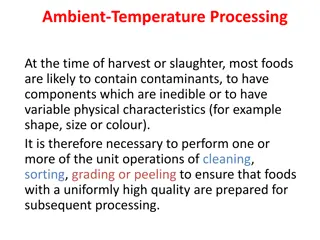Understanding Sorting Functions in Python
Explore sorting functions in Python with examples such as sorting lists alphabetically, customizing sort orders, and using sort keys to extract and compare values efficiently.
Download Presentation

Please find below an Image/Link to download the presentation.
The content on the website is provided AS IS for your information and personal use only. It may not be sold, licensed, or shared on other websites without obtaining consent from the author. Download presentation by click this link. If you encounter any issues during the download, it is possible that the publisher has removed the file from their server.
E N D
Presentation Transcript
Sorting Ruth Anderson UW CSE 160 Winter 2017 1
See in python tutor sorted vs. sort hamlet = "to be or not to be that is the question whether tis nobler in the mind to suffer".split() Returns a new sorted list (does not modify the original list) print "hamlet:", hamlet print "sorted(hamlet):", sorted(hamlet) print "hamlet:", hamlet print "hamlet.sort():", hamlet.sort() print "hamlet:", hamlet Modifies the list in place, returns None Lists are mutable they can be changed including by functions 2
See in python tutor Customizing the sort order Goal: sort a list of names by last name names = ["Isaac Newton", "Albert Einstein", "Niels Bohr", "Marie Curie", "Charles Darwin", "Louis Pasteur", "Galileo Galilei", "Margaret Mead"] print "names:", names This does not work: print "sorted(names):", sorted(names) When sorting, how should we compare these names? "Niels Bohr" "Charles Darwin" 3
See in python tutor Sort key A sort key is a function that can be called on each list element to extract/create a value that will be used to make comparisons. We can use this to sort on a value (e.g. last_name ) other than the actual list element (e.g. first_name last_name ). We could use the following sort key to help us sort by last names: def last_name(str): return str.split(" ")[1] print 'last_name("Isaac Newton"):', last_name("Isaac Newton") Two ways to use a sort key: 1. Create a new list containing the values returned by the sort key, and then sort it 2. Pass a key function to the sort or sorted function 4
See in python tutor 1. Use a sort key to create a new list Create a different list that contains the value returned by the sort key, sort it, then extract the relevant part: names = ["Isaac Newton", "Fig Newton", "Niels Bohr"] # keyed_names is a list of [lastname, fullname] lists keyed_names = [] for name in names: keyed_names.append([last_name(name), name]) 1) Create the new list. 2) Sort the list new list. If there is a tie in last names, sort by next item in list: fullname sorted_keyed_names = sorted(keyed_names) sorted_names = [] for keyed_name in sorted_keyed_names: sorted_names.append(keyed_name[1]) print "sorted_names:", sorted_names 3) Extract the relevant part. 5
Digression: Lexicographic Order Aaron Andrew Angie [1, 9, 9] [2, 1] [3] with withhold withholding [1] [1, 1] [1, 1, 1] Able Charlie baker delta [1, 1] [1, 1, 2] [1, 2] 6
See in python tutor 2. Use a sort key as the key argument Supply the key argument to the sorted function or the sort function def last_name(str): return str.split(" ")[1] names = ["Isaac Newton", "Fig Newton", "Niels Bohr"] print sorted(names, key = last_name) print sorted(names, key = len) If there is a tie in last names, preserves original order of values. def last_name_len(name): return len(last_name(name)) print sorted(names, key = last_name_len) 7
See in python tutor itemgetter is a function that returns a function import operator operator.itemgetter(2, 7, 9, 10) Returns a function Returns a function operator.itemgetter(2, 7, 9, 10)("dumbstricken") operator.itemgetter(2, 5, 7, 9)("homesickness") operator.itemgetter(2, 7, 9, 10)("pumpernickel") operator.itemgetter(2, 3, 6, 7)("seminaked") operator.itemgetter(1, 2, 4, 5)("smirker") operator.itemgetter(9, 7, 6, 1)("beatnikism") operator.itemgetter(14, 13, 5, 1)("Gedankenexperiment") operator.itemgetter(12, 10, 9, 5)("mountebankism") 8
See in python tutor Using itemgetter Another way to import, allows you to call itemgetter directly. from operator import itemgetter student_score = ('Robert', 8) itemgetter(0)(student_score) Robert itemgetter(1)(student_score) 8 student_scores = [('Robert', 8), ('Alice', 9), ('Tina', 7)] Sort the list by name: sorted(student_scores, key=itemgetter(0)) Sort the list by score sorted(student_scores, key=itemgetter(1)) 9
Two ways to Import itemgetter from operator import itemgetter student_score = ('Robert', 8) itemgetter(0)(student_score) Robert itemgetter(1)(student_score) 8 Or import operator student_score = ('Robert', 8) operator.itemgetter(0)(student_score) Robert operator.itemgetter(1)(student_score) 8 10
See in python tutor Sorting based on two criteria Goal: sort based on score; if there is a tie within score, sort by name Two approaches: Approach #1: Use an itemgetter with two arguments Approach #2: Sort twice (most important sort last) student_scores = [('Robert', 8), ('Alice', 9), ('Tina', 10), ('James', 8)] Approach #1: sorted(student_scores, key=itemgetter(1,0)) Approach #2: sorted_by_name = sorted(student_scores, key=itemgetter(0)) sorted_by_score = sorted(sorted_by_name, key=itemgetter(1)) 11
Sort on most important criteria LAST Sorted by score (ascending), when there is a tie on score, sort using name from operator import itemgetter student_scores = [('Robert', 8), ('Alice', 9), ('Tina', 10), ('James', 8)] sorted_by_name = sorted(student_scores, key=itemgetter(0)) >>> sorted_by_name [('Alice', 9), ('James', 8), ('Robert', 8), ('Tina', 10)] sorted_by_score = sorted(sorted_by_name, key=itemgetter(1)) >>> sorted_by_score [('James', 8), ('Robert', 8), ('Alice', 9), ('Tina', 10)] 12
See in python tutor More sorting based on two criteria If you want to sort different criteria in different directions, you must use multiple calls to sortor sorted student_scores = [('Robert', 8), ('Alice', 9), \ ('Tina', 10), ('James', 8)] Goal: sort score from highest to lowest; if there is a tie within score, sort by name alphabetically (= lowest to highest) sorted_by_name = sorted(student_scores, key=itemgetter(0)) sorted_by_hi_score = sorted(sorted_by_name, key=itemgetter(1), reverse=True) 13 Remember: Sort on most important criteria LAST
Sorting: strings vs. numbers Sorting the powers of 5: >>> sorted([125, 5, 3125, 625, 25]) [5, 25, 125, 625, 3125] >>> sorted(["125", "5", "3125", "625", "25"]) ['125', '25', '3125', '5', '625'] 14























